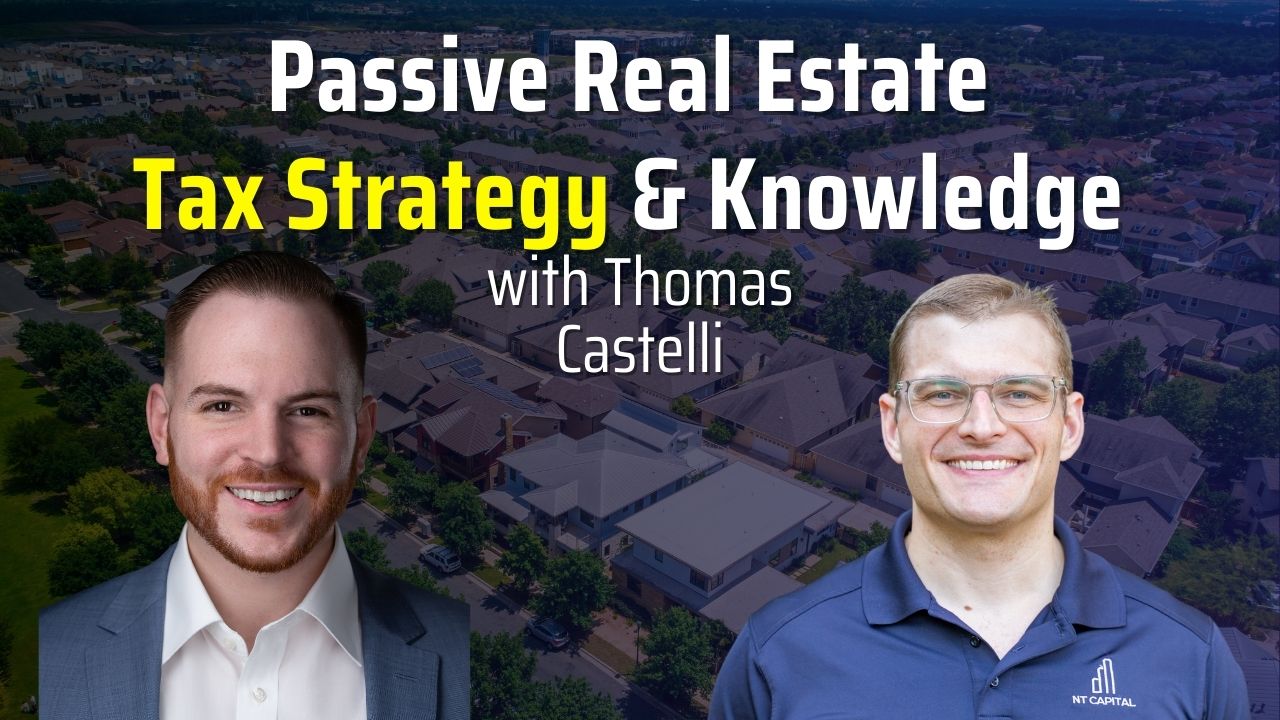
Passive Real Estate Tax Strategy & Knowledge with Thomas Castelli
In this episode we have the privilege of hosting Thomas Castelli, a CPA and real estate taxation expert. Thomas shares his expertise on the specific knowledge required by passive real estate investors regarding potential tax implications and advantages.
It is important to note that while this discussion provides valuable education, it is not intended as personalized advice. For specific tax guidance, it is recommended to consult with a tax professional who can assess your unique situation.
Understanding the K-1 Tax Form
One of the key tax forms that passive real estate investors receive is the K-1. Thomas explains that partnerships, which are common investment vehicles in real estate, do not pay taxes themselves. Instead, they distribute K-1 forms to investors, which outline each partner’s share of income, losses, deductions, and credits. It is crucial for investors to understand the information presented on the K-1, as it directly impacts their tax obligations.
Thomas highlights several important aspects of the K-1. Firstly, he emphasizes that taxes are paid on the allocated income from the partnership, not necessarily the distributions received. This distinction is often misunderstood, leading to confusion among investors. Additionally, Thomas points out that box two of the K-1, which represents the share of rental income or loss, is particularly significant for real estate investors. In the early stages of an investment, it is common to see losses due to depreciation and property improvements. However, these losses do not necessarily indicate a negative return on investment.
Furthermore, Thomas mentions other relevant boxes on the K-1, such as box one for ordinary business income, box five for interest income, and boxes nine and ten for capital gains upon property sale. He also draws attention to box L, which tracks the partnership capital account and determines whether taxes need to be paid on distributions exceeding the basis. Overall, understanding the K-1 is essential for passive real estate investors to accurately assess their tax obligations and make informed financial decisions.
Finding the Right CPA for Real Estate Taxation
Navigating the complexities of real estate taxation requires the expertise of a qualified CPA. Thomas provides valuable insights into vetting and selecting a tax professional who specializes in real estate. He suggests asking questions such as:
- How many real estate investors does the CPA work with?
- Does the CPA have clients in a similar investment position?
- Can the CPA provide testimonials or references?
By asking these questions, investors can ensure that their chosen CPA has the necessary experience and knowledge to handle their specific tax needs. Thomas also emphasizes the importance of reviewing the tax return before signing and submitting it. While a CPA prepares the return, it remains the taxpayer’s responsibility to ensure its accuracy. By actively participating in the review process, investors can identify any potential errors or discrepancies and rectify them before filing.
Balancing Tax Considerations with Investment Decisions
A common pitfall in real estate investing is letting the “tax tail wag the dog.” This phrase refers to making investment decisions solely based on potential tax benefits, rather than considering the overall investment strategy. Thomas cautions against rushing into investments solely for the purpose of reducing taxes. He provides examples such as the “Lazy 1031 Exchange” and buying properties solely for tax benefits, which can lead to poor investment choices and unfavorable outcomes.
To avoid this pitfall, Thomas advises investors to prioritize their investment criteria and then consider the tax implications within that framework. Taxes should be a factor in decision-making, but not the sole driving force. By focusing on the quality and potential return of an investment, investors can make sound financial decisions while still benefiting from available tax advantages.
Self-Directed Retirement Account Investing and UBIT
Self-directed retirement account investing, particularly through self-directed IRAs, is another area of interest for passive real estate investors. Thomas sheds light on the concept of Unrelated Business Income Tax (UBIT), which can affect investors who use self-directed IRAs to invest in properties financed with debt. UBIT is a tax on the portion of income or gain that is considered unrelated to the tax-exempt purpose of the IRA.
While UBIT can impact investors, Thomas reassures that the impact is often minimal, especially during the investment’s lifespan. The UBIT tax is typically triggered when the investment is sold and capital gains are realized. However, the overall effect on returns is usually modest, reducing returns by a few percentage points at most. Thomas also mentions that self-directed 401(k) or solo 401(k) investments are often exempt from UBIT, making them an attractive alternative for investors.
One challenge associated with self-directed IRAs and UBIT is the preparation of Form 990T, which is required to report UBIT. Thomas acknowledges that finding a CPA who can efficiently handle this form can be challenging and costly. However, he suggests that sponsors consider offering this service to their limited partners as a value-add, potentially streamlining the process and reducing compliance fees.
Passive real estate investors must familiarize themselves with the K-1 tax form and its implications. By understanding the information presented on the K-1, investors can accurately assess their tax obligations and make informed financial decisions.
Additionally, selecting a qualified CPA with expertise in real estate taxation is crucial for maximizing tax advantages and minimizing compliance issues.
Investors should avoid letting the tax tail wag the dog by prioritizing their investment criteria and considering tax implications within that framework. While tax benefits are important, they should not overshadow the overall investment strategy.
Finally, self-directed retirement account investing can offer unique opportunities, but investors must be aware of potential UBIT implications and the challenges associated with Form 990T preparation.
As the real estate market continues to evolve, it is essential for passive investors to stay informed and adapt their tax strategies accordingly.
By leveraging the expertise of qualified professionals and maintaining a holistic approach to investment decisions, passive real estate investors can build wealth while minimizing tax burdens.
About our Guest

Thomas Castelli
Thomas Castelli, CPA is a Partner at Hall CPA who helps real estate investors keep more of their hard-earned dollars in their pockets and out of the government’s through proactive tax strategy and planning.





